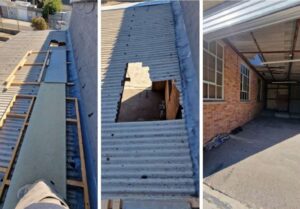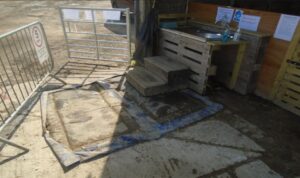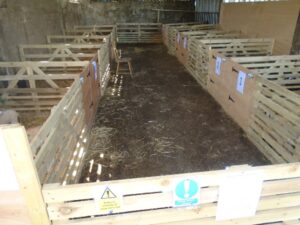Father and son sentenced for carrying out illegal gas work
- Work carried out on two properties in Northwich.
- One boiler illegal installed was found to be dangerous.
- Failures could have been catastrophic for homeowners.
An unregistered gas installer and his father have been sentenced after carrying out illegal gas work at two houses in Cheshire.
An investigation by the Health and Safety Executive (HSE) found that Scott Lodge, 37, carried out new boiler installations at two addresses in Northwich in April 2022 and December 2022 – doing so while not being registered with Gas Safe Register.
- Carrying out gas work without registration is illegal and potentially dangerous, as unqualified work can lead to gas leaks, fires, explosions, and carbon monoxide poisoning.
On one of those occasions, his father Brian, 67, who is a registered gas engineer, signed off the work and commissioned the boiler on his son’s behalf. He did this without attending the property to check the boiler for safety.

When one of the homeowners complained to the Gas Safe Register an inspection was carried out by a qualified engineer. That inspection identified defects resulting in the boiler being classed as at risk and a danger. This included a lack of support for the chimney and flue system, which carried the risk of carbon monoxide poisoning.
Members of the public are reminded that all gas work must be carried out by a Gas Safe registered engineer. The Gas Safe Register is the official list of gas businesses legally permitted to work on gas appliances. Anyone can check whether an engineer is registered by visiting www.gassaferegister.co.uk or calling 0800 408 5500.
Scott Lodge, of Adlington Drive, Northwich, pleaded guilty to breaching Regulation 3(3) of the Gas Safety (Installation and Use) Regulations 1998. He was given a 12-month community order and complete 200 hours of unpaid work. He was also told to pay £2,500 in costs at Chester Magistrates’ Court on 22 December 2025. He must also pay £1,460 to one of the affected homeowners, which covered the cost of the work.
Brian Lodge, of Merriman Avenue, Knutsford, pleaded guilty to breaching section 3(2) of the Health and Safety at Work etc. Act 1974. He was given the same sentence as his son and ordered to pay the same in costs at the same hearing.
Following the hearing HSE Inspector, Ian Betley, said: “This was a deliberate breach of gas safety legislation by Scott Lodge who undertook gas work which he knew he was not registered to do.
“His failures could have led to catastrophic and tragic consequences for the homeowners. To make matters worse, Brian Lodge knowingly signed off the work as safe, despite not examining or testing it.
“All gas work must be undertaken by Gas Safe registered engineers. The public should always ask to see the gas engineer’s identification and check the registration number online to ensure it is valid. Furthermore, registered gas engineers must not circumvent the legislative requirements by signing off unregistered work as their own.”
Gas engineers and consumers can contact the Gas Safe Register in any of these ways:
- Website: Gas Safe Register
- Phone – Consumers: 0800 408 5500; Engineers: 0800 408 5577
- Email – enquiries@gassaferegister.co.uk
This prosecution was brought by HSE enforcement lawyers, Sam Crockett and Karen Park, and paralegal officer, Stephen Grabe.
Further information:
- The Health and Safety Executive (HSE) is Britain’s national regulator for workplace health and safety. We are dedicated to protecting people and places, and helping everyone lead safer and healthier lives.
- More information about the legislation referred to in this case is available.
- Further details on the latest HSE news releases is available.
- HSE does not pass sentences, set guidelines or collect any fines imposed. Relevant sentencing guidelines must be followed unless the court is satisfied that it would be contrary to the interests of justice to do so. The sentencing guidelines for health and safety offences in Scotland can be found here.
- Guidance is available: The Gas Safety (Installation and Use) Regulations 1998. Relevant guidance can be found at Gas Safety (Installation and Use) Regulations 1998 (GSIUR) as amended. Approved Code of Practice and guidance – HSE










